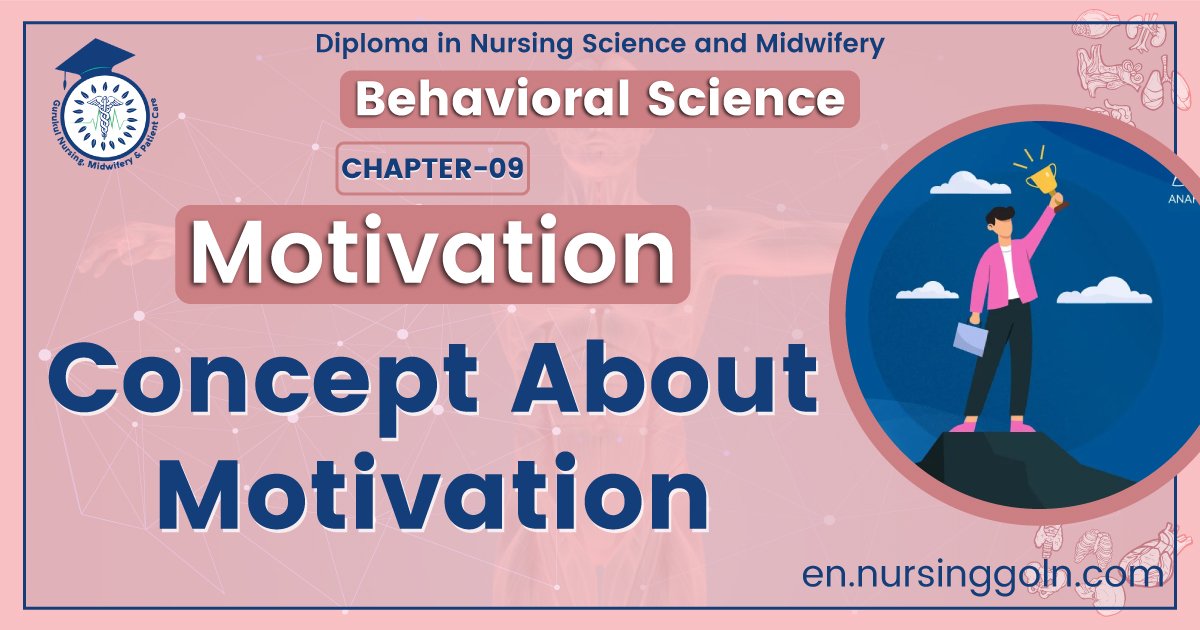Concept about Motivation – Behavioral sciences explore the cognitive processes within organisms and the behavioral interactions between organisms in the natural world. It involves the systematic analysis and investigation of human and animal behavior through the study of the past, controlled and naturalistic observation of the present and disciplined scientific experimentation and modeling.
It attempts to accomplish legitimate, objective conclusions through rigorous formulations and observation. Generally, behavior science deals primarily with human action and often seeks to generalize about human behavior as it relates to society.
Concept about Motivation
The term motivation is derived from the Latin word ’emover’ which implies ‘to move’. It is the act of stimulating someone or oneself to get a desired course of action, to push the right button to get desired action. Motivation is defined as conditions within the organism which arouse, maintain and direct behavior towards a specific goal’. It is a driving or pulling force which results in persistent behavior directed towards a particular goal. It is internal.
Motivation is a process of stimulating people to attain desired goals. Because motivation comes from within the person, a manager cannot directly motivate subordinates. But he can create an environment that maximizes the development of human potential.
The four components of motivation are need, drive, response and goal. When you are hungry, there is a need for food because your earlier intake of food is used up. The need for food caused you to feel hungry which is the drive which pushed you to find food. This is called the hunger drive. A biological need creates an aroused state (or drive).
The physiological aim of drive reduction is homeostasis. This drive caused you to respond with some action, which in this case was finding food which was your response. Actual eating was your goal.

When you had reached your goal by eating the food, your motivation to find food disappeared and your need for food was relieved for the time being. When you become hungry again, you go through the same motivation cycle again. Tension builds up until the need is satisfied (relief).
The word “motive” is commonly used to mean motivation. Generally motivation is made up of motives or drives. Motives are expressions of a person’s needs, hence they are personal and internal. Incentives are external. Motives are inferences from observations of behavior. They are powerful tools for the explanation of behavior, and they allow us to make predictions about future behavior. Motives are the “dynamos” of human behavior.
Motivation is the causative factor. Persistence is a sign of motivation we will mobilize all our energies in motivation. Interest is only a complementary factor or helping factor.
Definition of Motivation
According to Jacob Anthikad:
“Motivation is defined as conditions within the organism which arouse, maintain and direct behavior towards a specific goal”.
or
According to Dai a Breachus:
“Motivation can be defined as a willingness to expand energy, to achieve a goal or a reward”.
According to James Draver:
“Motivation is the term employed generally for the phenomena involved in the operation of incentives or drives”.
According to D.E. McFarland
“Motivation refers to the way in which urges, drives, desires, aspirations, strivings, needs, directs or control or explain the behaviour of human beings”.
According to Petri
“Motivation refers to the dynamics of behavior-the ways in which our actions are initiated sustained, directed and terminated”

Significance/Importance of Motivation for Nurses
The knowledge of motivation process will help the nurse in her profession as follows:
1. It will help her in maintaining her own mental health.
2. It will be helpful in her adjustment with doctors, patients and their relatives.
3. It will give her an etiology of patient’s behavior leading to better understanding.
4. It will help her in the diagnosing of the disease.
5. It will facilitate faster cure of the disease.
6. It will give her job satisfaction.
7. It will improve her relations with her colleagues.
8. It will be useful in solving most of the problems in interpersonal relationships.
The nurse has to remember that motives are at work in the life of patients, colleagues and own daily relationships. Understanding own motives and motives in the patient will help the
nurse to build a cooperative relationship between the patient and the health care team.
